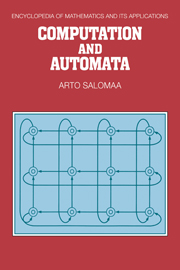Book contents
- Frontmatter
- Contents
- Editor's Statement
- Foreword by G. Rozenberg
- Acknowledgments
- Chapter 1 Introduction: Models of Computation
- Chapter 2 Rudiments of Language Theory
- Chapter 3 Restricted Automata
- Chapter 4 Turing Machines and Recursive Functions
- Chapter 5 Famous Decision Problems
- Chapter 6 Computational Complexity
- Chapter 7 Cryptography
- Chapter 8 Trends in Automata and Language Theory
- Historical and Bibliographical Remarks
- References
- Index
- ENCYCLOPEDIA OF MATHEMATICS AND ITS APPLICATIONS
Foreword by G. Rozenberg
Published online by Cambridge University Press: 05 April 2013
- Frontmatter
- Contents
- Editor's Statement
- Foreword by G. Rozenberg
- Acknowledgments
- Chapter 1 Introduction: Models of Computation
- Chapter 2 Rudiments of Language Theory
- Chapter 3 Restricted Automata
- Chapter 4 Turing Machines and Recursive Functions
- Chapter 5 Famous Decision Problems
- Chapter 6 Computational Complexity
- Chapter 7 Cryptography
- Chapter 8 Trends in Automata and Language Theory
- Historical and Bibliographical Remarks
- References
- Index
- ENCYCLOPEDIA OF MATHEMATICS AND ITS APPLICATIONS
Summary
The last twenty years have witnessed most vigorous growth in areas of mathematical study connected with computers and computer science. The enormous development of computers and the resulting profound changes in scientific methodology have opened new horizons for the science of mathematics at a speed without parallel during the long history of mathematics.
The following two observations should be kept in mind when reading the present monograph. First, various developments in mathematics have directly initiated the “beginning” of computers and computer science. Second, advances in computer science have induced very vigorous developments in certain branches of mathematics. More specifically, the second of these observations refers to the growing importance of discrete mathematics—and we are now witnessing only the very beginning of the influence of discrete mathematics.
Because of reasons outlined above, mathematics plays a central role in the foundations of computer science. A number of significant research areas can be listed in this connection. It is interesting to notice that these areas also reflect the historical development of computer science.
1. The classical computability theory initiated by the work of Gödel, Tarski, Church, Post, Turing, and Kleene occupies a central role. This area is rooted in mathematical logic.
2. In the classical formal language and automata theory the central notions are those of an automaton, a grammar, and a language.
- Type
- Chapter
- Information
- Computation and Automata , pp. xi - xiiPublisher: Cambridge University PressPrint publication year: 1985

